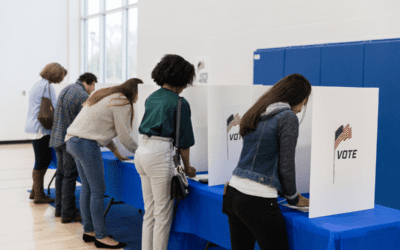
In this image from video released by the Select January 6 Committee on June 21, 2022, text messages are displayed in an exchange between Sean Riley, the chief of staff to Sen. Ron Johnson (R-Wisconsin) and Chris Hodgson, an aide to Vice President Mike Pence, on Jan. 6, 2021. (House Select Committee via AP)
The US House Committee investigating the Jan. 6 Insurrection outlined how fake electors weren’t there “just in case.” They were part of the plan to create the case to overturn the 2020 election.
Evidence made public Tuesday by the Jan. 6 Committee showed Wisconsin Sen. Ron Johnson was being positioned to deliver an “alternate slate of electors” to Vice President Mike Pence at the beginning of the joint session of Congress where electoral ballots were to be officially tabulated—a session interrupted by a violent insurrection. An aide to Pence sharply rejected the offer in a text exchange, saying “Do not give that to him.”
The fourth hearing of the Select Committee to Investigate the January 6th Attack on the United States Capitol focused on the efforts of former President Donald Trump, his allies, supporters, and members of his campaign to pressure state officials. It also examined the ways Trump sought to use the tools of state government to undermine public confidence in the 2020 presidential election and overturn the results that showed him losing the presidency to Joe Biden.
Part of the Trump effort included recruiting alternate slates of electors in key states that would falsely state Trump won the election in their state and send paperwork to Congress and the National Archives similar to what is filed by the genuine electors. One of the fake electors from Wisconsin, the chair of the state Republican Party, would later claim he and others were told their fraudulent votes were to be taken just in case a court somewhere overturned Biden’s win in Wisconsin.
Far from a just-in-case situation, the fake elector slates were part of how Trump tried to actually build the case that the Biden results were suspect and that Vice President Mike Pence should recognize Trump’s electors rather than Biden’s.
As part of a videotaped presentation, Casey Lucier, investigative counsel for the committee, outlined how Trump wanted at least two states to physically bring their fraudulent electoral ballots to Congress. She shared a text message from Mark Jefferson, executive director of the Republican Party of Wisconsin, who clearly did not think much of the idea.
“Freaking trump idiots want someone to fly original elector papers to the senate President. They’re gonna call one of us to tell us just what the hell is going on,” wrote Mark Jefferson on the night of January 4.
Lucier went on to show an exchange between a staffer for Johnson and a staffer for Vice President Pence.
“johnson needs to hand something to VPOTUS please advise,” wrote Johnson aide Sean Riley to Pence staffer Chris Hodgson.
“What is it?” Hodgson replied.
“Alternate slate of electors for MI and WI because archivist didn’t receive them,” Riley responded.
Hodgson’s answer left no room for doubt.
“Do not give that to him.”
After the hearing concluded, a spokesperson for Johnson tweeted: “The senator had no involvement in the creation of an alternate slate of electors and had no foreknowledge that it was going to be delivered to our office. This was a staff to staff exchange. His new Chief of Staff contacted the Vice President’s office.”
Wisconsin Election Commission Member Becomes a Fake Elector
The fake electors strategy didn’t occur in a vacuum. Weeks of Republican disinformation between Election Day and Jan. 6 fed the growing belief among Republican voters and officials that the election suffered from “irregularities.” As a result, it began to seem routine rather than radical that an alternate slate of electors would conven and submit paperwork wrongly claiming Trump had won in their state.
Robert Spindell agreed to be one of the 10 fraudulent Trump electors to meet in Madison, even while serving on the Wisconsin Elections Commission, the body entrusted to adhere to state election laws on behalf of all Wisconsinites. Spindell told the Washington Post his agreement to sign an elector certificate for Trump even though he had lost Wisconsin was a contingency in case the widely rumored “irregularities” actually led to the need for a Trump slate—even though Trump was losing a steady stream of court cases at the time because of the lack of actual fraud.
“From taking a lot of political science courses, I knew that if you miss a deadline for doing this, you can’t come back later and rework it,” said Spindell. “It was generally the view of the attorneys that should Trump win some of these cases, this had to be done.”
The committee Tuesday also released testimony from Wisconsin state Republican Party chair Andrew Hitt, another of the fake electors, who said he was told the alternate slate was needed just in case Trump won court cases that resulted in the overturning of Biden’s Wisconsin win.
“I was told that these would only count if a court ruled in our favor,” Hitt said. “So that would have been using our electors. Well, would have been using our electors in ways that we weren’t told about and we wouldn’t have supported.”
A ‘Movement’ That ‘Needs Constitutional Support’
The fake elector strategy was crafted by Trump campaign attorney John Eastman in a Nov. 28 memo titled “The Constitutional Authority of State Legislatures to Choose Electors.” Working with him was attorney Cleta Mitchell, employed at that time by Foley & Lardner in Milwaukee but acting in her own capacity.
“John — what would you think of producing a legal memo outlining the constitutional role of state legislators in designating electors?” Mitchell wrote to Eastman two days after the election, according to a report Monday in the Washington Post. “A movement is stirring. But needs constitutional support.”
Documents obtained by the Jan. 6 Committee show an intention to appeal to Republican state officials and lawmakers based on the need to address growing public doubts in the election results—even though the growing doubts were actually the result of Trump and his supporters spreading false information about fraud that did not exist.
In Wisconsin, Quickly Falling in Line and Undermining Election Integrity
State lawmakers, including Wisconsin Assembly Speaker Robin Vos (R-Rochester), quickly got to work after the election and developed potential schemes that could allow Republican-controlled legislatures to overturn the will of the voters or at least fan the flames of public doubt by spreading various conspiracy theories.
Only three days after voting had concluded, Vos announced the Assembly Committee on Campaigns and Elections would conduct an investigation “to immediately review how the election was administered,” without citing any instance of widespread fraud. Vos said the probe was needed because of “concerns” about “irregularities,” which in the absence of actual fraud only served to encourage more attacks on the credibility of an election that WEC administrator Meagan Wolfe said was an “incredible success.” She said such baseless claims are “insulting to our local election officials who “meticulously, carefully” followed the law.
Five days later, the drumbeat continued with Rep. Joe Sanfelippo (R-West Allis), vice chair of the Assembly Committee on Campaigns and Elections, putting out a statement that laid out potential justification for the Legislature to “declare this past election null and void and hold a new election or require our Electoral College Delegates to correct the injustice with their votes.” Sanfelippo made several false claims in his release titled “Restore Confidence in Our Elections,” which itself appears to be part of the GOP plan to undermine confidence in an election that was fair, safe, and accurate.
On Nov. 16, the Legislative Reference Bureau (LRB) sent a response to Vos about the Legislature’s potential role in choosing different electors. The LRB answer was to the point: No.
“You have asked whether the legislature, after a presidential election, may affect the selection or actions of the state’s presidential electors,” the memo said. “For the reasons discussed in this memorandum, the legislature may determine the manner of selection of presidential electors but may not affect the selection or actions of presidential electors after the election.”
The Fake Elector Strategy Was Predicted in September 2020
It was known well before the Nov. 3 balloting that Trump was unlikely to concede and quite likely to lie about whatever the vote totals said. After all, despite winning in 2016, he refused to recognize the popular vote—which Hillary Clinton won overwhelmingly—by claiming there were enough votes from illegal immigrants to conveniently wipe out her advantage. And famously, accepting the Republican Party’s nomination in August, Trump told the country he was plotting something.
“The only way they can take this election away from us is if this is a rigged election.”
The strategy of concocting doubts, refusing to concede, and even trying to wrest away control of the end result was all spelled out more than a month before the election in an article by Barton Gellman in The Atlantic magazine.
“According to sources in the Republican Party at the state and national levels,” Gellman wrote, “the Trump campaign is discussing contingency plans to bypass election results and appoint loyal electors in battleground states where Republicans hold the legislative majority. With a justification based on claims of rampant fraud, Trump would ask state legislators to set aside the popular vote and exercise their power to choose a slate of electors directly.”
Again, the strategy for claiming rampant fraud was being discussed weeks before any votes were cast, and the strategy for using states to concoct fake electors or legislative takeovers was in play shortly after Biden was rightfully acknowledged as having won the election.
Support Our Cause
Thank you for taking the time to read our work. Before you go, we hope you'll consider supporting our values-driven journalism, which has always strived to make clear what's really at stake for Wisconsinites and our future.
Since day one, our goal here at UpNorthNews has always been to empower people across the state with fact-based news and information. We believe that when people are armed with knowledge about what's happening in their local, state, and federal governments—including who is working on their behalf and who is actively trying to block efforts aimed at improving the daily lives of Wisconsin families—they will be inspired to become civically engaged.


Opinion: Many to thank in fair maps victory for Wisconsinites
On February 19, 2024, Governor Tony Evers signed into law new and fair state legislative maps, bringing hope for an end to over a decade of...

Opinion: Empowering educators: A call for negotiation rights in Wisconsin
This week marks “Public Schools Week,” highlighting the dedication of teachers, paras, custodians, secretaries and others who collaborate with...

Op-ed: Trump’s journey from hosting The Apprentice to being the biggest loser
Leading up to the 2016 election, Donald Trump crafted an image of himself as a successful businessman and a winner. But in reality, Trump has a long...

Not just abortion: IVF ruling next phase in the right’s war on reproductive freedom
Nearly two years after the US Supreme Court overturned Roe v. Wade, another court is using that ruling to go after one of the anti-abortion right’s...





